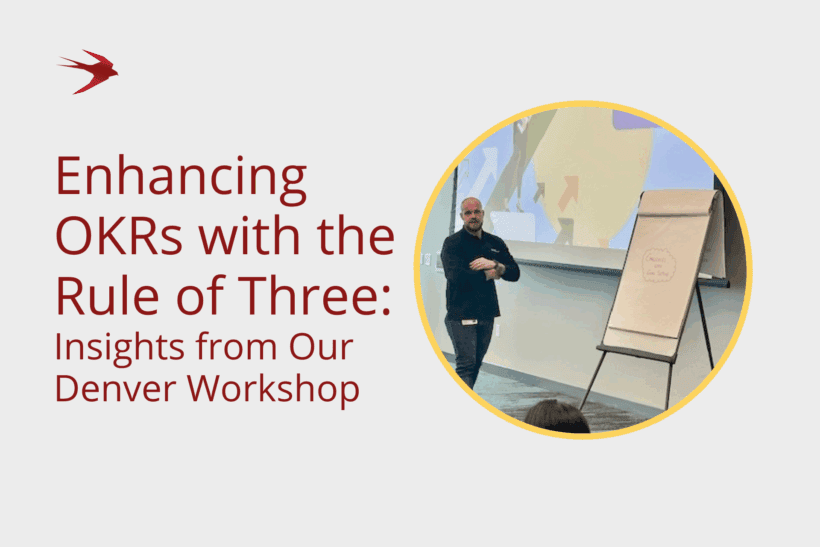Objectives and Key Results (OKRs) are a proven framework for setting and achieving strategic goals. However, many organisations struggle to implement OKRs effectively, resulting in unmet objectives and frustration.
We’ve worked with multiple companies to roll out OKRs and regularly see these common OKR anti-patterns. Understanding them can help your organisation avoid these traps and make the most of OKRs.
Here are the top five reasons why OKRs fail and how you can overcome these challenges.
Top Reasons Why OKRs Often Don’t Work
1. Starting with a Poorly Defined Strategy
A well-defined strategy is the cornerstone of effective OKRs.
Unfortunately, many organisations start with vague or generic goals such as “make more money” or “be more efficient.” These are not strategies but desired outcomes. A good strategy specifies what will make your organisation different and outlines a clear path to success.
For instance, instead of a broad objective to “increase revenue,” a more strategic goal might be to “capture 20% of the market in a new region by introducing a localized product line.” This approach provides clarity and direction, ensuring everyone understands the unique actions needed to achieve the objective.
We aim to work with executives not to dismantle their strategy, but to make it more connectable, using tools such as Roger Martin’s Strategy Choice Cascade or a series of strategy maps.
Try our AI-powered strategy and OKR assessment tool to self-assess your strategy and OKR maturity.
2. Lack of Discipline in Your OKR Cycle Cadence
OKRs are simple to understand, yet difficult to master. They require a disciplined approach to stay committed to and effective. Without a regular cadence of setting, reviewing, and adjusting OKRs, they can become static and lose their impact.
Establishing a quarterly cycle for setting OKRs ensures that goals align continuously with the organisation’s evolving priorities. Regular check-ins, whether weekly or bi-weekly, are essential to maintain focus, address challenges promptly, and keep teams accountable. This discipline transforms OKRs from a mere goal-setting tool into a dynamic framework for continuous improvement and agility.
3. Failure to Prioritise Work
Another common reason for OKR failure is the inability to prioritise work effectively. When organisations set too many objectives, it leads to an overload of work in progress and diluted efforts. This not only hampers productivity but also creates confusion and stress among teams.
To avoid this, limit the number of OKRs at each level of the organisation. Focus on a few high-impact objectives that can significantly advance your strategic goals. By prioritising these key objectives, you ensure that people, resources and efforts are concentrated on what truly matters, enhancing the likelihood of achieving meaningful results.
Too much work in progress is the biggest barrier to success that we see in every company that we work in – it’s time to stop starting, and start finishing.
Read about Agile Prioritisation Techniques here.
4. Functional Silos Competing
Functional silos within an organisation can significantly undermine the effectiveness of OKRs. When departments or teams operate in isolation, they may pursue conflicting goals, leading to competition rather than collaboration. OKRs should foster cross-functional teamwork and break down these barriers.
Encourage departments to set complementary objectives that contribute to the organisation’s overall success. For example, sales, engineering and manufacturing teams can collaborate on an objective to enhance product quality and reduce customer complaints.
By aligning OKRs across functions, you create a culture of collaboration where teams work together towards shared goals, enhancing overall organisational performance.
5. Lack of Knowledge and Support
Effective OKR implementation requires a clear understanding of the framework and ongoing support. Without this foundation, teams may struggle to create well-defined and realistic OKRs.
Learn about some of our field-tested OKR implementation lessons.

Invest in comprehensive training programs to educate employees about the principles and practices of OKRs. Provide the necessary resources and tools to support OKR development and tracking. Leadership should actively champion the OKR process, offering guidance and ensuring that teams have the support they need to succeed.
Regular workshops, coaching sessions, and access to OKR software can significantly improve the quality and execution of OKRs, leading to better outcomes and greater organisational alignment.
To back up our experience, McKenna Agile Consultants have recently become accredited trainers for OKR Mentors, meaning that we can deliver certified OKR training for practitioners, leaders, OKR champions and professional coaches.
Does This Sound Familiar?
By addressing these common reasons for OKR failure, your organisation can unlock the full potential of this powerful goal-setting framework. A well-defined strategy, disciplined cycle, prioritised work, collaborative environment, and robust support system are the cornerstones of successful OKR implementation.
At McKenna Agile Consultants, we specialise in helping organisations navigate these challenges and achieve their strategic objectives through effective OKR practices. Our expert guidance ensures that your team can leverage OKRs to drive alignment, focus, and performance. Contact us today to learn how we can support your journey towards greater organisational success.


